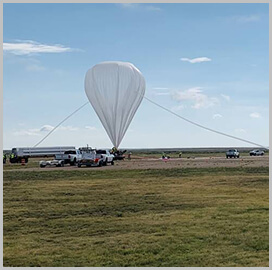
POC's 2024 5th Annual AI
Summit
Breaking Down the 2024 AI Summit Panels
Over 500 of the sharpest minds in government technology gathered at the Marriott Fairview Park in Falls Church, Virginia on March 21st to discuss the hottest topic in the industry: artificial intelligence. The 5th Annual AI Summit was Potomac Officers Club’s most popular and thrilling event yet!
Below you’ll find highlights worth remembering from the day’s keynote panel discussions.
To browse a list of upcoming POC-hosted events, click here. The next vital gathering of GovCon’s top executives is right around the corner—join us on Wednesday, April 17 for the 5th Annual CIO Summit.
Panel: “Leveraging Collaboration to Accelerate AI Adoption in the DOD”
Participants: Dr. Don Widener (BAE Systems), Phil Sage (Johns Hopkins University Applied Physics Laboratory), Dr. Matthew Johnson (CDAO at DOD), George Forbes (U.S. Air Force) and moderator Holly Levanto (Booz Allen Hamilton)
Primary takeaways:
- Forbes: gov maybe too conservative about information it shares with public about AI
- Should release analytical frameworks for intelligence (AFIs) or policy documents about AI to public to enhance understanding
- Johnson: Back office function is a proven utility + safe way to test AI for battlefield capability
- Johnson: CDAO, DOD, Air Force looking at a grassroots approach to auditing systems and models as a pathfinder
- Forbes: AI training for younger people should involve short videos a la TikTok, YouTube; this is how younger generations learn
- Sage: AI not just isolated thing, it’s a system-of-systems
- Important to locate bias in one part of the system, ID how that affects rest of system
- Levanto: “AI is only good as the data that feeds it”
- Johnson: “It is a really exciting time for responsible AI in the international space”
- June 2023 AI Partnership for Defense conference
- Political Declaration on Responsible Military Use of Artificial Intelligence and Autonomy
- Upcoming Responsible AI in the Military Domain Summit in South Korea
- GovCon Wire coverage
- Additional coverage
Panel: “A Journey to AI”
Participants: Moderator Martin Klein (ECS), David Carroll (Cybersecurity and Infrastructure Security Agency), BG Jake Kwon (U.S. Department of the Army), Stuart Wagner (U.S. Department of the Air Force) and Ravi Gourineni (Fearless Digital)
Primary takeaways:
- Wagner: DOD currently views AI as a capability to “drop in,” leverage. However, AI = dynamic tool that should be “constantly calibrated.”
- Wagner: “We may show up to a war with a better capability and still lose it if our adversary can adapt faster than us”
- Not about what we’re coming to the conflict with, it’s about analyzing the data, learning & adapting
- Gourineni: more effective AI achieved not by building massive systems, but by inserting AI into existing ones, improving from there
- Carroll: engineers need to fail fast, fail often
- Kwon: gov + DOD need to do better job sunsetting programs when they’ve passed effectiveness
- Kwon: 4 pillars of Army AI adoption:
- Tech advances
- Right data, right place, right time, in the right amount
- Culture change
- Industry partnerships
- GovCon Wire coverage
Panel: “Operationalizing AI in Government: Getting Things Done With Automation”
Participants: Brandy Durham (ManTech Corporation), moderator Jeff Bohling (Empower AI), George Linares (Centers for Medicare & Medicaid Services) and Stephen Wallace (Defense Information Systems Agency)
Primary takeaways:
- Wallace: AI doesn’t just take away mundane tasks from users, but improves accuracy
- Can cut down a 10 minute task to 30 seconds
- Durham: ManTech utilizing AI to increase focus on outcomes
- Wallace: Look out for an RFI from DISA on “how we can better leverage AI with respect to cyber defense”
- Wallace: Need to build guardrails around models when training, figure out how to keep from getting polluted
- Have found it’s not hard to make an AI hallucinate based on bad data
- Linares: operational efficiencies a big area of utility; making knowledge links
- Walace: other transaction authorities (OTAs) = great tool for innovation
- ExecutiveBiz coverage
Panel: “Preparing Now for the Future of AI”
Participants: Dr. Alex Jaimes (Dataminr), Chris Kraft (Department of Homeland Security), Nick Weir (Yurts), Amanda Bullock (Air Force Research Laboratory), and moderator Brian Sacash (Redhorse Corporation)
Primary takeaways:
- Jaimes: Not many changes in the core tech of AI in last year, but major change = the ecosystem and the availability of more LLMs
- Weir: Integrating different tools with LLMs “is really transforming how people use these models”
- Bullock: AFRL promoting AI exploration for workforce using three key methods:
- Hands-on training
- Internship programs
- Knowledge-sharing
- Kraft predicts new federal policies related to the Oct. 2023 responsible AI executive order are coming soon
- Weir: government can improve trust in AI via frameworks preparing for responsible development of AI
- Jaimes: People trust AI too much, sometimes forget they’re talking to AI because of how conversationally adept it is
- Examples of non-LLM federal usages of AI:
- Deep learning
- Analyzing pre- and post-Hurricane Sandy images
- Machine learning algorithm flew an autonomous jet
- Automating processes
- GovCon Wire coverage
Panel: “Diagnosing the Human Enterprise (Getting to Leading Indicators):”
Participants: Andrew Auerbach (Amazon Web Services), Dr. Dan Hudson (Huntington Ingalls Industries), Michaela Mesquite (Office of the Director of National Intelligence), Dr. Patrick O’Connell (U.S. Department of the Navy) and moderator Dr. Nanda Ramanujam (Huntington Ingalls Industries)
Primary takeaways:
- Auerbach: 2 key characteristics of data as it relates to AI: quality and accessibility.
- Hudson: AI in shipbuilding starts with digital transformation, cloud modernization initiatives, moves to leveraging data, model-based approaches
- Hudson: GenAI will supercharge these capabilities, improve how you plan and execute complex overhauls
- Generating and evaluating innovative strategies through rapid prototyping and experimentation
- Discovering previously hidden interdependencies, bottlenecks
- Rapid retrieval and dissemination of vast amounts of product data
- Creating customized emerging training modules
- Enhancing collaboration and communication across diverse cross functional teams
- Informing decisions in wartime scenarios
- Mesquite: creation of Intelligence Community chief AI officers will aid AI and governance coordination
- O’Connell and Mesquite: DOD and IC should keep up with being modular so solutions can come in and out as fast as possible
- Navy just now moving from ‘built to last’ to ‘built to change’
Panel: “Getting Left of Strategic Surprise: Adopting AI Advantages for an Unpredictable World”
Participants: LTG (Ret) Bob Ashley (GLS), Kyle Fox (SOSi), Paul Scharre (Center for a New American Security) and moderator Mark Brunner (Primer AI)
Primary takeaways:
- Ashley: AI = purpose built for information operations, has made traction in computer vision, effective for mission planning
- Ashley: Computer vision
- Helps deal with scale of all the things we collect
- Applications for targeting, dealing with bandwidth limitations
- Hone down data, automate workflows
- Fox: re: CJADC2, DOD has not put enough of an emphasis on retiring legacy systems
- Need stronger industry consortium at DOD CIO level looking at retiring systems, implementing tangible roadmaps
- “Until we get serious about retiring these systems, it’s difficult to move at speed”
- Scharre: re: CJADC2, people, planes, ships don’t matter as much as what’s on those vessels

Category: Speaker News




